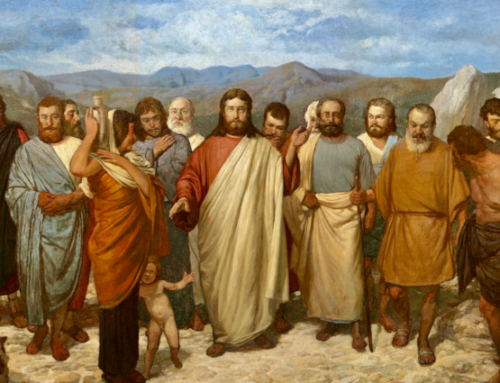 This summer and fall, we’ve talked a lot about the decline of civility in our politics—because of growing political polarization, bickering on social media, and rudeness in public spaces. “Every day rudeness, disrespect and hostility sideline collaboration and compromise,” the National Institute for Civil Discourse writes on their website. “Sound bites replace sound journalism. Extremes on both ends of the political spectrum stymie productive dialogue. The public, initially worn and weary, is increasingly enraged about how the lack of civility has left government helpless in the face of our nation’s most pressing problems.” Many of us are worried by the direction our discourse has taken. But even if we are not part of the problem, we could all do a better job advancing civility in our own lives.
This summer and fall, we’ve talked a lot about the decline of civility in our politics—because of growing political polarization, bickering on social media, and rudeness in public spaces. “Every day rudeness, disrespect and hostility sideline collaboration and compromise,” the National Institute for Civil Discourse writes on their website. “Sound bites replace sound journalism. Extremes on both ends of the political spectrum stymie productive dialogue. The public, initially worn and weary, is increasingly enraged about how the lack of civility has left government helpless in the face of our nation’s most pressing problems.” Many of us are worried by the direction our discourse has taken. But even if we are not part of the problem, we could all do a better job advancing civility in our own lives.
The word civility stems from the Latin civilis: “relating to a citizen, relating to public life, befitting a citizen; popular, affable, courteous.” In the sixteenth century, civility was inextricably tied to the idea of “good citizenship”—it was a necessarily public virtue and connected to the performance of a person’s civic duty. Civility necessarily implies engagement in the public sphere—not withdrawal, even if it is a polite withdrawal. A proper response to rudeness and boorishness in the national sphere, therefore, is not abandonment or quiet derision, but rather an active and energetic effort to reinvigorate and renew civil discourse.
The National Institute for Civil Discourse aims to do this with a variety of tools on their website, including a personal pledge to act personally and locally to revive civility, and a variety of suggestions for putting together community conversations and municipal proclamations.
But we can start our fight for civility in smaller ways, too: in her book Building the Benedict Option, journalist Leah Libresco talks about events she hosted that were built out of political and spiritual struggle. She used her home as a safe space to welcome in the discouraged or the doubtful, and encouraged a discourse that was respectful, ordered, and cordial.
Taking It Home
When friends were frustrated following the 2016 presidential election, she put together a poetry-reading night and urged them to come share a piece of poetry that was nourishing to their souls. She wanted to turn their gaze back to the true, the good, and the beautiful at a time in which they felt disillusioned and depressed. When a political discussion on Facebook turned fractious, Mrs. Libresco welcomed the participants into her home, where they broke bread together and followed Robert’s Rules of Order in continuing the discussion.
Mrs. Libresco’s example shows that often, our debates are worse when we are not communing together—when we are not regular physical presences in each other’s life. We are more likely to be rude to a stranger on the street or a random person on the internet than we are to a neighbor or to someone we meet at a friend’s house. The fewer ties that bind us, the less pressure we feel to be kind. Thus, one of the ways to encourage cordiality and respect is to remind ourselves and those around us of those ties. Citizens who create and foster a network of civil engagement—via pizza parties in the aftermath of a contentious election, or a book or debate club that enables folks to talk through contentious ideas with grace—do an important work in binding society back together.
But civility, as it is a public virtue, also implies public action and service. Citizens need to participate in a larger story or work: public action gets us out of our own navel-gazing frustration and reminds us of the larger responsibilities that we share. Working together locally at a homeless shelter, soup kitchen, or park battles feelings of powerlessness and encourages a sense of camaraderie with those who might otherwise annoy or frustrate us. Encouraging friends to go vote together or attend a town hall meeting together, followed by happy hour drinks and discussion, might be another way to encourage others not to abandon the public sphere, but rather to engage in ways that are tangible, local, and respectful.
Using Social Media
It is important that these ideas involve physical action. Many millennials and young people are increasingly engaging in “civic” action on their phones: using social media to fight for social justice or downloading apps that enable them to comment on municipal issues. This is not an entirely bad thing, but it does twist rather awkwardly away from the classical idea of civility being a public act of virtue. If our only engagement happens from the comfort and privacy of our smartphone, engagement turns into an almost consumptive activity, one in which we put forth our demands without demanding any tangible work or service from ourselves.
Social media can be an excellent tool for connecting and deploying our efforts, as Mrs. Libresco’s example points out. But rather than serving as the medium and means of our civil discourse, social media should merely be the instigator of real, physical connection. This would help take the hot air out of online debates and put such discourse back into a humane context. It would also help citizens remember their duty to the physical spaces and neighborhoods around them. The decline of civility is part of a larger trend toward isolation in our society—a pulling away that, while not caused by the internet, has certainly been exacerbated by it. As Robert Nisbet writes in his classic work The Quest for Community, modern man is experiencing a deep “sense of disenchantment and alienation,” caused at least in part by our abandonment of communal life (such as one might find in the church, local business, local civic and nonprofit associations, and the family).
“It has become increasingly clear to me that alienation is one of the determining realities of the contemporary age: not merely a key concept in philosophy, literature, and the social sciences . . . but a cultural and psychological condition implicating ever larger sections of the population,” he wrote, adding that “for millions of persons such institutions as state, political party, business, church, labor union, and even family have become remote and increasingly difficult to give any part of one’s self to.”
Fixing this problem will require an intentional reinvigoration of local, public spheres and a conscious effort to promote “good citizenship.” Civility declines when we text and argue behind our phones. The only way to fix that is to step away from our screens and embrace real community once more.
Republished with gracious permission from Intercollegiate Review (Fall 2018)
The Imaginative Conservative applies the principle of appreciation to the discussion of culture and politics—we approach dialogue with magnanimity rather than with mere civility. Will you help us remain a refreshing oasis in the increasingly contentious arena of modern discourse? Please consider donating now.
Editor’s Note: The featured image is “Demonstration” by Stanisław Osostowicz.







Leave A Comment